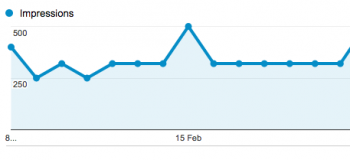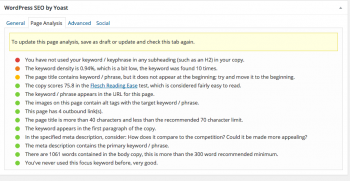A guide to hobby & social media – SEO (Part 7)
Jeff from Tibbs Forge asked me to take a look at his site regarding SEO, so I did – here is some of what I had to say to him. I thought it would be good to share this with others. Jeff’s site is not bad, its great and you should definitely check it out on a regular basis but he has kindly given me permission to share my findings with the wider hobby community and make this article part of my Social Media series. If you do not own a blog or web site then this article may be largely useless for you.
I have expanded a lot on my first email to Jeff, so Jeff, if you’re reading this you need to read it again!
I am no SEO expert, its something I do but not something I do a lot. I do it more on my own sites than on client sites. But by all means have a read, give me some feedback and of course ask me any questions you may have! I may well add to this as questions arise and I have more thoughts.
Quick Glossary
Some of the things I talk about may not be obvious to everyone. So in an effort to help none-web people here is a quick glossary of terms used in this article;
- Meta Tags – these are small pieces of code inserted into web pages that tells other sites such as Google about the page. Commonly used Meta Tags are the meta description, meta title and meta keywords. The Meta data does not effect the content of your page, only what other sites are told about your page.
- Content is King – your page’s content is the most important thing, headings, meta tags, WordPress plugins will not help you if you do not write content that is useful and specific.
- Page Title – this can be swapped with the terms page name, blog title, blog name, article name and article title. What I essentially mean is the main name given to a page. For example this page is called “A guide to hobby & social media – SEO (Part 7)” and its the first heading on the page.
- Keyword – this can be a single word or a phrase. It represents a term you’re targeting on a page and therefore a term you wish to be associated with in search rankings. For example this page might use the keyword “SEO” because its about SEO and I want this page to be found by users Googling for the word SEO.
- Alt Text – a setting used for images so that Google knows what an image is about. Its also used for screen readers.
- Tau – A dirty alien race from the Warhammer 40K universe. They should be purged.
Meta Tags
Meta tags are no longer such a big deal, the keywords meta we do not even populate on our client sites. The meta description is important because it makes up the black text, under the blue link on Google search results. It gives you some gain from an SEO perspective. Now I have said these things you need to know why these two things about meta tags are true because it will shape the entry rest of this little walk through / guide, as well as your everything you write in the future?
Meta tags have no bearing on your page’s content, the content that matters for your users. The meta keywords can be anything you like, the end user, the reader never ever gets to read them. So you can put what you want in there, lets say “Imperial Knights Codex” – because thats trending now. Google will ignore it because your page could be about anything, the fact that the meta keywords say “Imperial Knights Codex” does not mean that is what your page is actually about. You can’t hijack the meta keywords with high value keywords in the hope of boosting your Google rankings.
The same is true for the description, although less so, the user sees this on the Google search results but not actually on the page itself. So making it catchy and relevant to your content is key here. It should contain specific phrases you want users to find you for, but those phrases should also appear in your actual page content too. So don’t jam pack your meta description with the word “Imperial Knight” because thats relevant right now when your actual article is about the Tau Codex. Google will see that and get confused.
The meta title and meta description should be descriptive and useful for the user. Capture the article in the meta title and describe the full article in the description. If you do not do this then Google will pull out the first 155 characters of your article for the meta description – while the first 155 characters might be OK, they perhaps won’t describe the whole article as well as you could.
Images
Including images is good fro SEO, if you do this make sure you set the image’s “alt” text (alternative text) to something that relates to the image and your targeted keyword. This associates the keyword to the image and gives you a slight benefit to SEO. Its also the phrase that is read out to users who are visually impaired that are using screen readers.
Page Headings
Page headings do matter and should be used to great effect. For example if you have a page about the Tau, your page name will probably have the word Tau in, your content will also have the word Tau in too. Its OK to then use that word in a title too.
For example your article might be called “Tau Riptide Conversion to Chaos”, this is a great for targeting the word Tau because Tau is the first word. You should then try and use the word Tau in a header in the main page body too, for example “Tau Riptide Weapon Conversion” – now you have the word Tau in the main page title and in another header. A good example is here for the term “Eldar” – I have it in the main page heading and in a sub heading further down the page. Its not over the top, it breaks up the page a little and helps with SEO. Everyone wins!
Effective Keyword Selection
So the term Tau and Eldar are terrible choices for keyword selection and targeting – why? Because they are extremely competitive. There are 13.8 million results in Google for Eldar. My one page about Eldar is not going to rank well in amongst that lot. You need to be more targeted and specific when deciding to target specific keywords for a page. Eldar or Tau will not work because there are millions of pages competing against you.
Instead get clever and get niche. My above example for Eldar actually also targets the term “Eldar Craftworlds” because its much more specific and relatively new, there are only 101,000 pages relating to this term. Its much less competitive and much more specific, so I am more likely to rank higher than targeting a broad term such as Eldar.
Going back to the fake article about a “Tau Riptide Conversion to Chaos”, this title is good but its not perfect. The chances of someone searching for that phrase or a sub set of that phrase are low. Its not very natural. If I wanted to find out about a Riptide conversion to Chaos I may search for “Chaos Riptide”. So a much better page name might be “Chaos Riptide – Conversion”. We now have a more popular, natural and specific keyword at the start “Chaos Riptide”.
Descriptive Page Names
One issue Jeff had was related to the names of his blog articles, they are imaginative and abstract. They do not describe the page’s content in simple terms. There is a trade off here; do you write blog article names perfectly for SEO or do you write them to tease your reader and only show slightly what an article is about? How much to you value your mojo and personality when writing your blog articles?
A good example of this is the paint chipping article on Tibbs Forge titled Paint Chips Ahoy! Its a good article name, but it does not sum up the article and it won’t rank in Google for anything useful or hobby related. Better titles might be “How to chip paint” or “How to chip paint in 40K” or “How to chip model paint” or “Hobby – paint chipping”. This is not as fun as the current title but it will gain rankings for new and relevant terms.
You can also splatter those types of phrases in sub headings or in the content itself too. But it takes time, its taken nearly a year to get my blog to where it is now on Google. This is a good example of what I am talking about http://cadianshock.com/bullgryn-tactics/. Bullgryn Tactics appears in the main title, the url, a sub heading and in the copy. Its not overkill but its in there, I rank number one for the term on Google. It also helped that I wrote this nearly as soon as they were released.
Yoast SEO Plugin
If you use WordPress then you should definitely be using the Yoast SEO plugin. This will show you what SEO elements on each article you have done and have missed. You can select a keyword to target the Yoast SEO plugin will give you analysis for that page and how well it performs for that keyword in SEO terms.
Content is King
Finally Content is King, always remember that. This all comes down to the page content, if you write good content that contains the keywords people search for you will climb the search rankings. Google places the most importance on your actual content, just like your readers do.
If you want a different angle then head to House of Paincakes, by a complete fluke Thor over there has done a similar article!
That is all for now, next time Increasing Blog Engagement!
Don’t want to miss an article? Subscribe on this page on the right panel, at the top!


